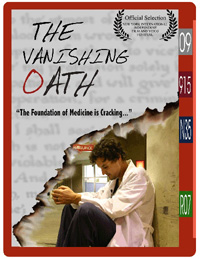May 10th, 2010 by DrWes in Better Health Network, Health Policy, Opinion, True Stories
No Comments »

 Yesterday a much-anticipated package arrived in the mail containing a documentary film directed (and acted) by a young emergency room physician, Ryan Flesher, M.D., and produced by a former clinical social worker, Nancy Pando, L.I.C.S.W. The film is called “The Vanishing Oath.”
Yesterday a much-anticipated package arrived in the mail containing a documentary film directed (and acted) by a young emergency room physician, Ryan Flesher, M.D., and produced by a former clinical social worker, Nancy Pando, L.I.C.S.W. The film is called “The Vanishing Oath.”
As background, the film is a 3-year project born in 2007 just before the great U.S. healthcare reform debate began. Over 200 hours of interviews were conducted to explore a simple question:
Why Dr. Flesher had grown to hate medicine. Read more »
*This blog post was originally published at Dr. Wes*
May 7th, 2010 by DrWes in Better Health Network, Humor, News, Research
No Comments »

 From Freep.com:
From Freep.com:
“Medical researchers at Wayne State University have asked hunters in the state [Michigan] to donate the hearts of harvested wild turkeys for researching heart disease and congestive heart failure.
The National Wild Turkey Federation recently joined the school in making the appeal. Researchers hope that tests using wild turkey hearts could lead to medical breakthroughs for combating heart problems in humans.” Read more.
-WesMusings of a cardiologist and cardiac electrophysiologist.
*This blog post was originally published at Dr. Wes*
May 4th, 2010 by DrWes in Better Health Network, Health Policy, News, Opinion, Research
No Comments »

 How much would a heart attack cost you? Quite a bit, according to CBS MoneyWatch.com:
How much would a heart attack cost you? Quite a bit, according to CBS MoneyWatch.com:
According to an article from the National Business Group on Health, the average total [editor’s note: lifetime] cost of a severe heart attack -– including direct and indirect costs -– is about $1 million. Direct [lifetime] costs include charges for hospitals, doctors and prescription drugs, while indirect costs include lost productivity and time away from work. The average [lifetime] cost of a less-severe heart attack is about $760,000. Amortized over 20 years, that’s $50,000 per year for a severe heart attack and $38,000 per year for a less-severe heart attack.
I’m all for maintaining a healthy lifestyle, but before we get all hot and bothered about performing more testing to “prevent” a heart attack as a means to save healthcare costs going forward, remember the lessons we learned from the Tim Russert fallout. Read more »
*This blog post was originally published at Dr. Wes*
May 2nd, 2010 by DrWes in Better Health Network, Patient Interviews, True Stories, Video
No Comments »

Mr. Ron Murray, a tranplant heart recipient, tells his story:
From the video:
“If the transplant issue ever comes up for anyone listening, that’s almost the first thing they would think, too. If I had time to think about it over that year, I would have realized ‘Oh, my God.’ I would have apprehension all built up about how I would react to…I mean is it going to change my way of thinking? Is it going to alter my own thoughts? None of that holds up, ultimately.
When I realized that there was going to be forever an emotional component, and maybe a spiritual component to this thing that I hadn’t thought about, is when I became –- God, I don’t even know if I can tell you about it –- that I began to grieve for the donor, that brought me to tears several of those nights. Read more »
*This blog post was originally published at Dr. Wes*
April 29th, 2010 by DrWes in Better Health Network, Health Tips, Opinion, Research
No Comments »

I can’t read for any length of time in a moving vehicle — it makes me nauseous. This is because in order for the body to determine where it is at all times, the brain combines visual information, touch information, inner ear information, and internal expectations to judge its position in space.
Under most circumstances, the senses and expectations agree. When they disagree, there is conflict, and motion sickness can occur. In my case with reading in a car, my eyes that are fixed on the written page tell my brain that I am still. However, as the car goes over bumps and accelerates or decelerates, my inner ear disagrees resulting in my brain activating the nausea center and causing motion sickness.
Well, the same thing might happen with 3D TV. Read more »
*This blog post was originally published at Dr. Wes*
 Yesterday a much-anticipated package arrived in the mail containing a documentary film directed (and acted) by a young emergency room physician, Ryan Flesher, M.D., and produced by a former clinical social worker, Nancy Pando, L.I.C.S.W. The film is called “The Vanishing Oath.”
Yesterday a much-anticipated package arrived in the mail containing a documentary film directed (and acted) by a young emergency room physician, Ryan Flesher, M.D., and produced by a former clinical social worker, Nancy Pando, L.I.C.S.W. The film is called “The Vanishing Oath.”


 From
From  How much would a heart attack cost you? Quite a bit, according to
How much would a heart attack cost you? Quite a bit, according to 







